Amsco chapter 4 - Study guides, Class notes & Summaries
Looking for the best study guides, study notes and summaries about Amsco chapter 4? On this page you'll find 65 study documents about Amsco chapter 4.
Page 2 out of 65 results
Sort by
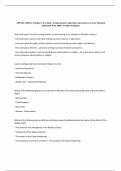
-
APUSH AMSCO Chapter 3 & 4 Quiz | Comprehensive Questions and Answers Latest Updated 2024/2025 With 100% Verified Solutions
- Exam (elaborations) • 8 pages • 2024
- Available in package deal
-
- $13.48
- + learn more
APUSH AMSCO Chapter 3 & 4 Quiz | Comprehensive Questions and Answers Latest Updated 2024/2025 With 100% Verified Solutions
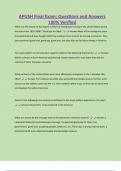
-
FULL PACKAGE::-APUSH BUNDLED EXAMS WITH COMPLETE SOLUTIONS
- Package deal • 18 items • 2024
-
- $38.99
- + learn more
AMSCO APUSH Chapter 1-15; Questions and Answers 100% Verified 2 Exam (elaborations) APUSH AMSCO Practice Examination Study Guide; Questions and Answers 100% Verified 3 Exam (elaborations) APUSH AMSCO Practice Examination Study Guide; Questions and Answers 100% Verified 4 Exam (elaborations) APUSH Final Exam Prep; Questions and Answers 100% Verif
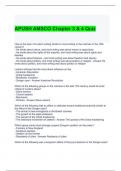
-
APUSH AMSCO Chapter 3 & 4 Quiz with correct Answers
- Exam (elaborations) • 6 pages • 2024
- Available in package deal
-
- $11.49
- + learn more
APUSH AMSCO Chapter 3 & 4 Quiz
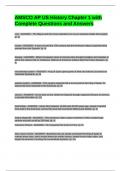
-
AMSCO AP US History Chapter 1 with Complete Questions and Answers
- Exam (elaborations) • 4 pages • 2024
- Available in package deal
-
- $10.99
- + learn more
AMSCO AP US History Chapter 1 with Complete Questions and AnswersAMSCO AP US History Chapter 1 with Complete Questions and AnswersAMSCO AP US History Chapter 1 with Complete Questions and AnswersAMSCO AP US History Chapter 1 with Complete Questions and Answers corn - ANSWER - The Mayas and the Incas cultivated corn as an important stable food supply. (p. 2) horses - ANSWER - It was not until the 17th century that the American Indians acquired these animals from the Spanish. (p. 4) disease...
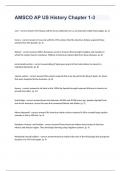
-
AMSCO AP US History Chapter 1-3 questions n answers graded A+
- Exam (elaborations) • 15 pages • 2024
- Available in package deal
-
- $17.99
- + learn more
AMSCO AP US History Chapter 1-3corn - correct answers The Mayas and the Incas cultivated corn as an important stable food supply. (p. 2) horses - correct answers It was not until the 17th century that the American Indians acquired these animals from the Spanish. (p. 4) disease - correct answers When Europeans came to America they brought smallpox and measles to which the natives had no resistance. Millions of American Indians died from these diseases. (p. 8) encomienda system - correct ...
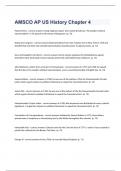
-
AMSCO AP US History Chapter 4 correctly answered rated A+
- Exam (elaborations) • 4 pages • 2024
- Available in package deal
-
- $9.99
- + learn more
AMSCO AP US History Chapter 4 Patrick Henry - correct answers Young Virginian lawyer who coined the phrase "No taxation without representation" in his speech to the House of Burgesses. (p. 73) Stamp Act Congress - correct answers Representatives from nine colonies met in New York in 1765 and decided that only their own elected representatives had the power to approve taxes. (p. 73) Sons and Daughters of Liberty - correct answers Secret society organized to intimidated tax agents. Someti...
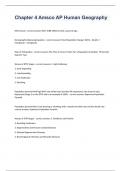
-
Chapter 4 Amsco AP Human Geography correctly answered graded A+
- Exam (elaborations) • 2 pages • 2024
- Available in package deal
-
- $9.99
- + learn more
Chapter 4 Amsco AP Human GeographyRNI formula - correct answers RNI= (CBR-CDR)/10 with a percent sign Demographic Balancing Equation - correct answers Total Population Change= Births - Deaths + Immigrants - Immigrants Rule of 70 Equation - correct answers The Time in Years it Takes For a Population to Double= 70/Growth Rate Per Year Names of DTM Stages - correct answers 1. High Stationary 2. Early Expanding 3. Late Expanding 4. Low Stationary 5. Declining Population pyramid wi...
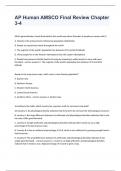
-
AP Human AMSCO Final Review Chapter 3-4 correctly answered graded A+
- Exam (elaborations) • 4 pages • 2024
- Available in package deal
-
- $9.99
- + learn more
AP Human AMSCO Final Review Chapter 3-4 Which generalization is best illustrated by the world map above (Number of people per square mile?) A. Climate is the primary factor influencing population distribution B. People are spread out evenly throughout the world C. The majority of the world's population live between 20 N and 60 N latitude D. More people live in the Western Hemisphere than the Eastern Hemisphere E. People have preserved fertile land for farming by choosing to settle heavil...

-
AMSCO AP US History Chapter 1-3 Latest Update Rated A+
- Exam (elaborations) • 26 pages • 2023
- Available in package deal
-
- $9.99
- + learn more
AMSCO AP US History Chapter 1-3 Latest Update Rated A+ corn The Mayas and the Incas cultivated corn as an important stable food supply. (p. 2) horses It was not until the 17th century that the American Indians acquired these animals from the Spanish. (p. 4) disease When Europeans came to America they brought smallpox and measles to which the natives had no resistance. Millions of American Indians died from these diseases. (p. 8) encomienda system King of Spain gave grants of land and natives ...
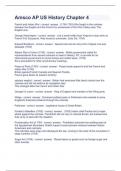
-
Amsco AP US History Chapter 4 Question and answers 2023/2024 verified to pass
- Exam (elaborations) • 4 pages • 2023
- Available in package deal
-
- $13.99
- + learn more
Amsco AP US History Chapter 4 Question and answers 2023/2024 verified to passFrench and Indian War - correct answer () War fought in the colonies between the English and the French for possession of the Ohio Valley area. The English won. George Washington - correct answer Led a small militia from Virginia to stop work on French Fort Duquesne. Was forced to surrender. (July 3rd, 1754) Edward Braddock - correct answer General who led an army from Virginia, but was defeated (1755) ...

$6.50 for your textbook summary multiplied by 100 fellow students... Do the math: that's a lot of money! Don't be a thief of your own wallet and start uploading yours now. Discover all about earning on Stuvia


